高中英语重点系列巧记lie的过去式和过去分词(无答案)-课件
- 格式:doc
- 大小:47.00 KB
- 文档页数:1

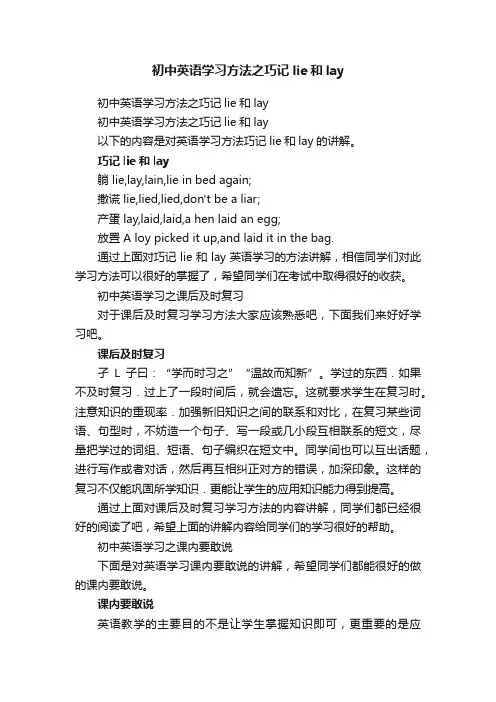
初中英语学习方法之巧记lie和lay初中英语学习方法之巧记lie和lay初中英语学习方法之巧记lie和lay以下的内容是对英语学习方法巧记lie和lay的讲解。
巧记lie和lay躺 lie,lay,lain,lie in bed again;撒谎 lie,lied,lied,don't be a liar;产蛋 lay,laid,laid,a hen laid an egg;放置 A loy picked it up,and laid it in the bag.通过上面对巧记lie和lay英语学习的方法讲解,相信同学们对此学习方法可以很好的掌握了,希望同学们在考试中取得很好的收获。
初中英语学习之课后及时复习对于课后及时复习学习方法大家应该熟悉吧,下面我们来好好学习吧。
课后及时复习孑L子曰:“学而时习之”“温故而知新”。
学过的东西.如果不及时复习.过上了一段时间后,就会遗忘。
这就要求学生在复习时。
注意知识的重现率.加强新旧知识之间的联系和对比,在复习某些词语、句型时,不妨造一个句子、写一段或几小段互相联系的短文,尽量把学过的词组、短语、句子编织在短文中。
同学间也可以互出话题,进行写作或者对话,然后再互相纠正对方的错误,加深印象。
这样的复习不仅能巩固所学知识.更能让学生的应用知识能力得到提高。
通过上面对课后及时复习学习方法的内容讲解,同学们都已经很好的阅读了吧,希望上面的讲解内容给同学们的学习很好的帮助。
初中英语学习之课内要敢说下面是对英语学习课内要敢说的讲解,希望同学们都能很好的做的课内要敢说。
课内要敢说英语教学的主要目的不是让学生掌握知识即可,更重要的是应用.这就要求在课堂上尽可能地让学生去说。
有一小部分的学生怕害羞、怕出差错,不敢开口讲,尤其是当教师邀请他们在班上用英语进行对话或表演时,他们更少主动参与。
此时教师应鼓励学生大胆去说,在说的过程中,发现错误,并及时给学生纠正,加深其印象。

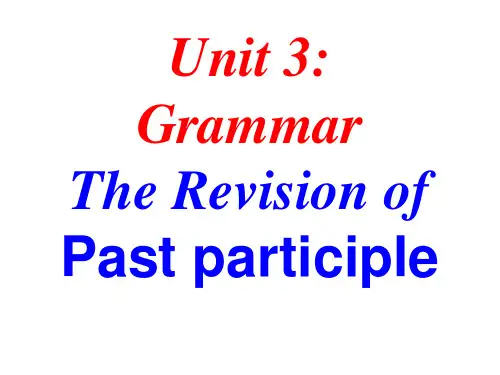
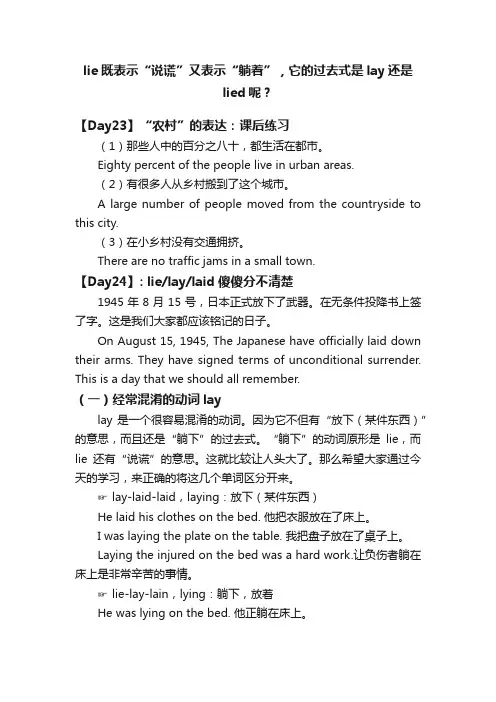
lie既表示“说谎”又表示“躺着”,它的过去式是lay还是lied呢?【Day23】“农村”的表达:课后练习(1)那些人中的百分之八十,都生活在都市。
Eighty percent of the people live in urban areas.(2)有很多人从乡村搬到了这个城市。
A large number of people moved from the countryside to this city.(3)在小乡村没有交通拥挤。
There are no traffic jams in a small town.【Day24】: lie/lay/laid 傻傻分不清楚1945年8月15号,日本正式放下了武器。
在无条件投降书上签了字。
这是我们大家都应该铭记的日子。
On August 15, 1945, The Japanese have officially laid down their arms. They have signed terms of unconditional surrender. This is a day that we should all remember.(一)经常混淆的动词laylay是一个很容易混淆的动词。
因为它不但有“放下(某件东西)”的意思,而且还是“躺下”的过去式。
“躺下”的动词原形是lie,而lie还有“说谎”的意思。
这就比较让人头大了。
那么希望大家通过今天的学习,来正确的将这几个单词区分开来。
☞ lay-laid-laid,laying:放下(某件东西)He laid his clothes on the bed. 他把衣服放在了床上。
I was laying the plate on the table. 我把盘子放在了桌子上。
Laying the injured on the bed was a hard work.让负伤者躺在床上是非常辛苦的事情。
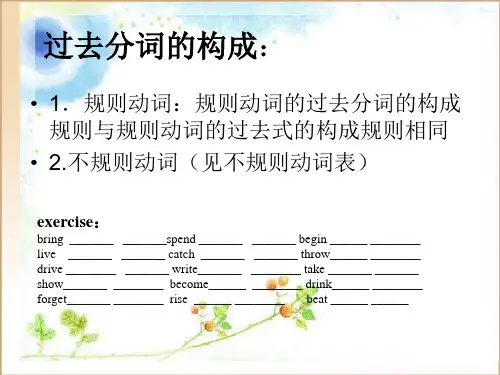
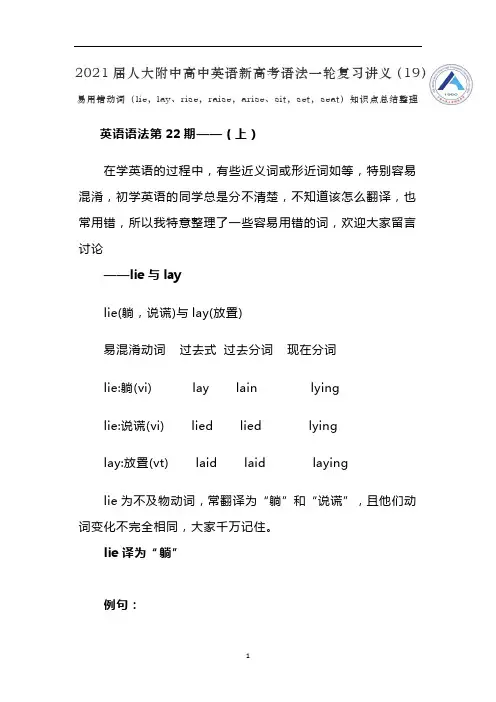
2021届人大附中高中英语新高考语法一轮复习讲义(19)易用错动词(lie,lay、rise,raise,arise、sit,set,seat)知识点总结整理英语语法第22期——(上)在学英语的过程中,有些近义词或形近词如等,特别容易混淆,初学英语的同学总是分不清楚,不知道该怎么翻译,也常用错,所以我特意整理了一些容易用错的词,欢迎大家留言讨论——lie与laylie(躺,说谎)与lay(放置)易混淆动词过去式过去分词现在分词lie:躺(vi) lay lain lyinglie:说谎(vi) lied lied lyinglay:放置(vt) laid laid layinglie为不及物动词,常翻译为“躺”和“说谎”,且他们动词变化不完全相同,大家千万记住。
lie译为“躺”例句:动词原型:Ge You will lie on the sofa for a while(葛优将在床上休躺片刻)过去式:Ge You came in and lay on the sofa (葛优走进来躺在了沙发上)过去分词:Ge You has lain on the sofa for eight hours (葛优在床上躺了八个钟头了)现在分词:Ge is lying on the sofa all day(葛优整天躺在沙发上)以上是不及物动词lie作为“躺”的用法。
lie作为“说谎”也是不及物动词,用法基本一样,不再赘述。
lay(vt.放置,产卵),例句:He will lay a book one the desk(他会把一本书放在桌上)He laid a book on the desk(他放了一本书在桌上)需要注意的是lie(躺)的过去式lay与及物动词lay(放置,产卵)在形态上是一样的,区分的方法是看lay后面是否有宾语,因为只有及物动词后面才跟宾语。
如果实在记不住看看下面的助记口诀:lei与lay动词变化助记口诀规则的撒谎lie撒谎过去式过去分词规则变化不规则的躺lie躺过去式过去分词不规则变化躺过就下蛋躺的过去式是下蛋的原形下蛋不规则下蛋的过去式过去分词不规则变化——sit、set和seat易混淆动词过去式过去分词现在分词sit:坐(vi.) sat sat sittingset:安置(vt.) set set settingseat:使就坐(vt.) seated seated seatingsit为不及物动词,后面无需加宾语,seat为及物动词,需加宾语例1:He came in and sat down(他走进来并坐了下来)在口语中请就坐可以使用祈使句:sit down ,please或者please have a seat。
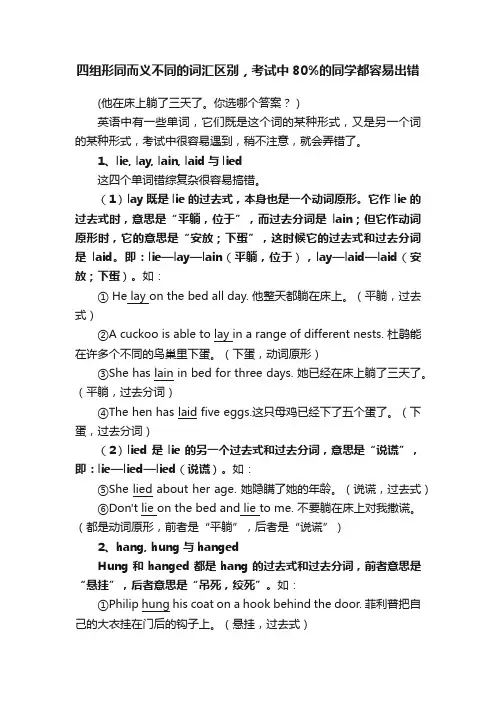
四组形同而义不同的词汇区别,考试中80%的同学都容易出错(他在床上躺了三天了。
你选哪个答案?)英语中有一些单词,它们既是这个词的某种形式,又是另一个词的某种形式,考试中很容易遇到,稍不注意,就会弄错了。
1、lie, lay, lain, laid与lied这四个单词错综复杂很容易搞错。
(1)lay既是lie的过去式,本身也是一个动词原形。
它作lie的过去式时,意思是“平躺,位于”,而过去分词是lain;但它作动词原形时,它的意思是“安放;下蛋”,这时候它的过去式和过去分词是laid。
即:lie—lay—lain(平躺,位于),lay—laid—laid(安放;下蛋)。
如:① He lay on the bed all day. 他整天都躺在床上。
(平躺,过去式)②A cuckoo is able to lay in a range of different nests. 杜鹃能在许多个不同的鸟巢里下蛋。
(下蛋,动词原形)③She has lain in bed for three days. 她已经在床上躺了三天了。
(平躺,过去分词)④The hen has laid five eggs.这只母鸡已经下了五个蛋了。
(下蛋,过去分词)(2)lied是lie的另一个过去式和过去分词,意思是“说谎”,即:lie—lied—lied(说谎)。
如:⑤She lied about her age. 她隐瞒了她的年龄。
(说谎,过去式)⑥Don't lie on the bed and lie to me. 不要躺在床上对我撒谎。
(都是动词原形,前者是“平躺”,后者是“说谎”)2、hang, hung与hangedHung和hanged都是hang的过去式和过去分词,前者意思是“悬挂”,后者意思是“吊死,绞死”。
如:①Philip hung his coat on a hook behind the door. 菲利普把自己的大衣挂在门后的钩子上。

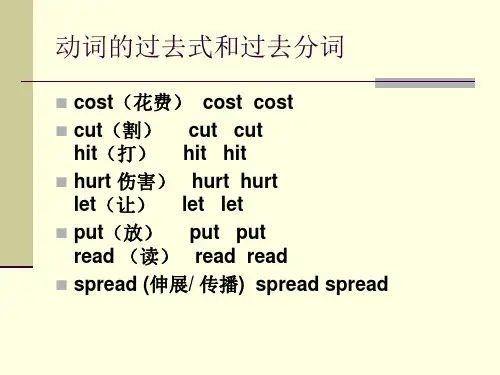
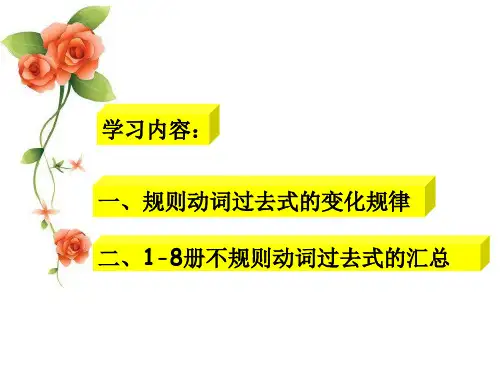
1
重点 巧记lie的过去式和过去分词
Lie, lay, lain; stay in bed again. Lie, lied lied ; don’t be a liar.
Lay, laid, laid; a hen lays an egg.
He lied that the cock had laid an egg.
练习: